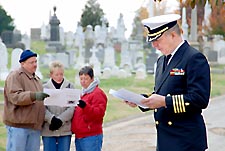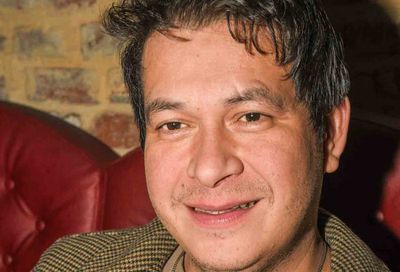Honor Role
Gay veterans gather to honor those who served
The headstone above Leonard P. Matlovich’s grave at the Congressional Cemetery in Southeast D.C. does not include his name. It simply reads ”A Gay Vietnam Veteran,” reflecting Matlovich’s wish for his grave to be a memorial for all gay veterans.
And that’s exactly what it’s become. It’s a fitting tribute for Matlovich, who first garnered national attention in the mid-1970s when he challenged the Air Force policy that automatically discharged gay service members. Matlovich died 18 years ago, yet his legacy continues to inspire the fight against the U.S. military’s discriminatory policies against gays, even today. And last Saturday, Nov. 4, nearly 40 people gathered at his gravesite for the fifth annual gay veterans memorial service, ”Honoring Our Fallen.”
 Participants at Saturday’s ”Honoring Our Fallen” memorial (Photo by Todd Franson) |
Michael Rankin, a gay clinical professor of psychiatry and behavioral sciences at the George Washington University School of Medicine and Health Sciences, organized the event with the help of the Arlington Gay & Lesbian Alliance and American Veterans for Equal Rights.
”This is probably the biggest crowd we’ve had and the more that we can get the word out that we’re doing this, the better,” he said.
Others attending included Sgt. Brett A. Parson of the Metropolitan Police Department’s Gay and Lesbian Liaison Unit.
”This [ceremony] represents the epiphany of the struggle for gay and lesbian rights,” Parson said following the ceremony. ”This is one of the federally codified ways in which gay and lesbian people are still discriminated against in this country. It’s people coming together recognizing that gay and lesbian people serve, even despite those laws, and people die everyday in our armed forces serving this country despite the law that says they cannot live openly as gay and lesbian people.”
Rankin knew several years ago that he wanted to do something to honor the memory of the many gay veterans he had met during his 24-year-tenure as a medical officer in the United States Navy and Navy Reserve. ”I started this because so many of those young men and women died, and no one honored them as gay and lesbian veterans,” he said.
”I felt that was a message the country should have, that we fought in all of these wars, we died in all of these wars and we should be given all the rights that everyone else has, because we defended them.”
In 2001, Rankin organized D.C.’s first gay veterans memorial ceremony. He originally considered holding the event at the Arlington National Cemetery, until a friend mentioned Matlovich’s resting place.
”I thought, this is perfect, this is just where we ought to be.”
Five years later, Matlovich’s gravesite has become what many refer to as the ”Gay Ghetto,” a burial site for at least 10 other gay veterans, including those who have not died yet and have bought plots there, such as gay veteran Tom Swann, and Rankin.
”It’s outstanding and it’s something very new,” Rankin said. ”So many of us want to be buried close to each other. I’m thinking about being buried here and I’m talking to friends, who are saying why don’t we all come here. It’s something I’m thinking seriously about.”
On Saturday, the ceremony began with Philip Moore singing the national anthem, followed by comments by honorary guest retired Air Force Col. Carl Abrams.
”I am here under false pretenses,” said the retired colonel, referring to an article in the Washington Blade that he said had caused some confusion as to his role in Matlovich’s discharge from the Air Force.
”The article said [I] refused [to serve as a legal advisor to Matlovich’s discharge board]. Anybody in the military knows that you don’t refuse a direct order. You talk people out of it….
”It doesn’t make me quite as heroic as an order refused would be.”
But many, including Parson, would argue that Abrams’s actions were heroic.
”He knew that it was the wrong thing to do and stood up and said ‘I can’t do this,”’ Parson said. ”He didn’t refuse, but he certainly felt strongly enough that he was not made to do it.”
After 15 years in the military, Abrams, who is straight, had a realization about the anti-gay policy. ”It dawned on me that kicking people out because they were gay was ridiculous.”
By the mid-1970s, Abrams had shifted gears and taken on the role of chief judge of the Air Force. He had moved away from discharging gay servicemen — at least until the Matlovich case made national headlines.
”I got a call from Washington,” he said. ”They were going to appoint me as the legal advisor of [Matlovich’s discharge board], so I reminded them of my feelings against this type of [discriminatory] action, pointed out, I hope rather subtly, that with all the press there it was possible that my bias might slip through, and did the Air Force really want that? They quickly agreed ‘no’ and that was it.”
After moving to Washington to work as chief judge, Abrams says he got a surprise visit from Matlovich, who lived around the corner from him.
”I found him to be a very charming guy and we had a lot of discussions together about the question of homosexuality, politics and many other things.”
Abrams did not get to say goodbye to Matlovich, who died of AIDS-related complications in 1988. On Saturday, Abrams laid a wreath on Matlovich’s grave.
When thinking about Matlovich, he remembers two things:
”It seemed to me — and I may be wrong — that he was working on a project to put a monument here in the cemetery to Harvey Milk, [the first openly gay city supervisor of San Francisco, who was assassinated in 1978].
”The other thing that really sticks in my mind,” Abrams continued, ”is a crack that he made that I thought was very funny. He said the only trouble with being a figurehead and hero to the homosexual movement was that nearly every member of the movement was a liberal and he was basically a conservative.”
Support Metro Weekly’s Journalism
These are challenging times for news organizations. And yet it’s crucial we stay active and provide vital resources and information to both our local readers and the world. So won’t you please take a moment and consider supporting Metro Weekly with a membership? For as little as $5 a month, you can help ensure Metro Weekly magazine and MetroWeekly.com remain free, viable resources as we provide the best, most diverse, culturally-resonant LGBTQ coverage in both the D.C. region and around the world. Memberships come with exclusive perks and discounts, your own personal digital delivery of each week’s magazine (and an archive), access to our Member's Lounge when it launches this fall, and exclusive members-only items like Metro Weekly Membership Mugs and Tote Bags! Check out all our membership levels here and please join us today!























